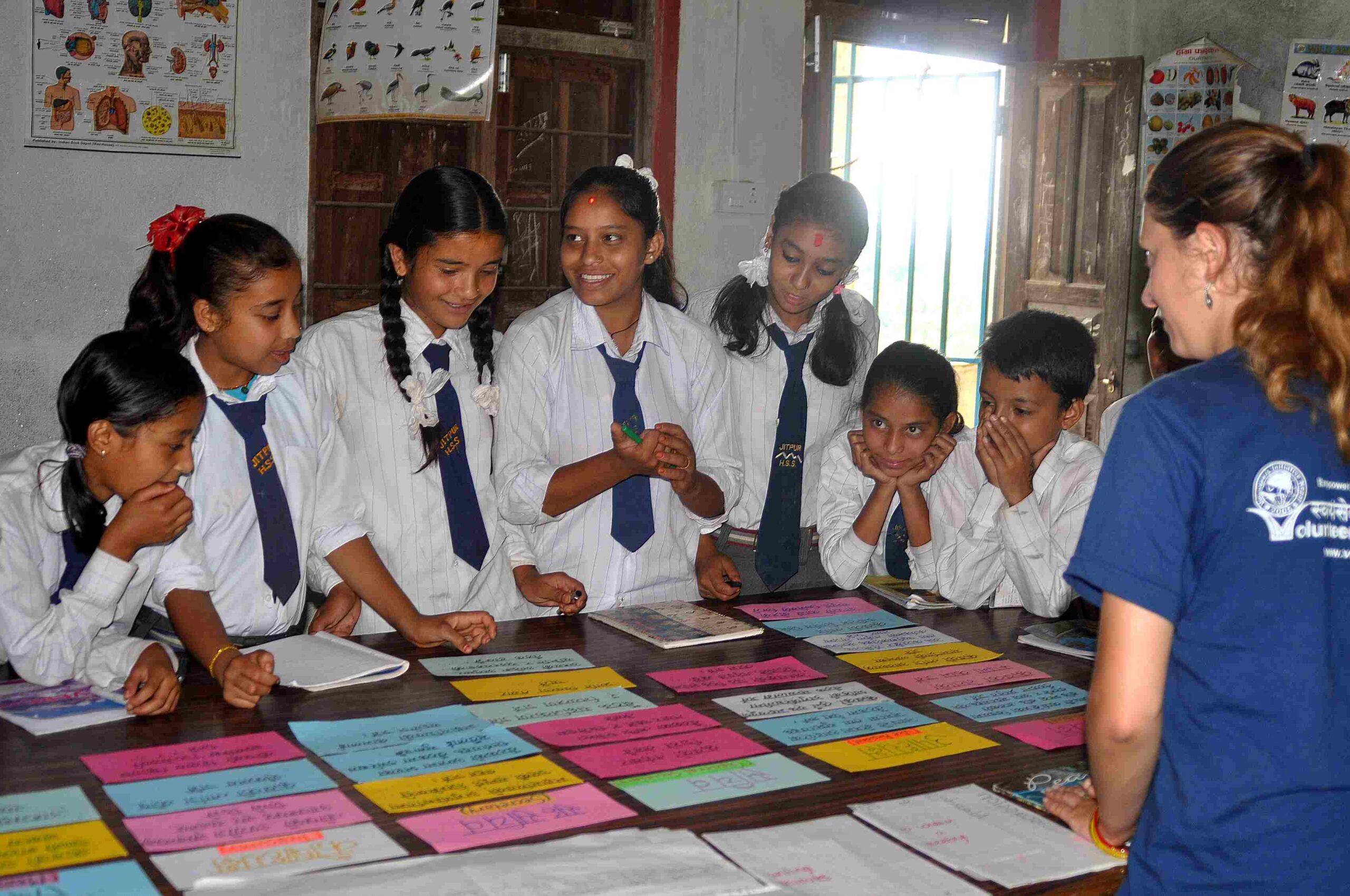Project Overview
Educational Support Volunteer Programs in Nepal
| 📍 | Location | Outskirts of Kathmandu & Okhaldhunga |
| 📅 | Start Dates | Every 1st & 3rd Monday |
| ⏳ | Duration | 2 weeks to 10 months |
| ⏰ | Working Hours | 3-6 hrs/day, 5 days/week |
| 🏡 | Accommodation & Food | Stay with a host family or at a volunteer hostel |
| 👥 | Eligibility | Open to volunteers 18+, families, couples, & groups |
| 🛡️ | Safety & Support | 24/7 assistance & secure placements |
| 🎓 | Orientation | 2-3 days on arrival training |
| 🌏 | Weekend Travel | Explore festivals, temples, Himalayas, & immerse in culture |
| 💰 | Fees | Transparent; covers essentials.Click here to learn more |

Educational Support Volunteer Programs in Nepal
Are you passionate about Educational Support Volunteer Programs in Nepal that cultivate brighter futures? Do you dream of participating in Volunteer Teaching Programs for Children that blend cultural immersion, skill-building, and heartfelt community service? Our Child Education Support Volunteer Opportunities in Nepal offer just that. From remote mountain villages to bustling city wards, volunteers bring tutoring, mentorship, and resources to children who crave a better learning environment. Applying your energy and empathy can enrich academic journeys, spark confidence, and ensure Nepali youth realize their potential.
Introduction
“Empowering Minds” responds to the desire for robust, inclusive education in Nepal, especially in under-resourced communities. Volunteers in these tutoring volunteer programs for kids or mentoring volunteer opportunities for youth partner with local teachers or social workers to deliver creative lessons, interactive reading sessions, and personal support. By reinforcing classroom experiences, offering extracurricular guidance, or bridging technology gaps, volunteers help ensure no Nepali child is left behind academically.
Background
Nepal’s literacy rates keep climbing, yet rural and semi-urban regions often see high dropout rates and minimal academic engagement beyond core subjects. A 2021 government report indicates that only around 67% of students finish lower secondary schooling. Many families can’t afford private tuition or specialized tutoring. Our literacy volunteer programs for children or homework help volunteer programs address these needs by channeling volunteer expertise into expanded learning, whether remedial reading or advanced math clubs. Over time, volunteers transform intangible academic struggles into tangible successes.
Key Objectives
- Enhance Academic Performance
Provide personalized tutoring, bridging classroom lessons with one-on-one support, thus elevating reading, math, or language proficiency. - Foster Confidence and Leadership
Guide children toward self-expression, creativity, and interpersonal growth, forging well-rounded learners. - Expand Curriculum Access
Introduce fresh teaching methods—like project-based tasks, group debates, or using digital tools—to augment local pedagogy. - Strengthen Local Capacity
Train teachers, develop new lesson plans, or share resources so your volunteer efforts continue after you leave.
The Need
- Statistics: According to the Nepalese Ministry of Education, over 30% of rural children struggle with reading fluently by Grade 5, limiting higher-level learning. Disproportionate teacher-student ratios hamper personalized attention.
- Social Impact: Education is at the heart of community upliftment. By joining Volunteer Teaching Programs for Children or Child Education Support Volunteer Opportunities, you empower families to break cycles of poverty and unveil broader professional horizons for youth.
Global Relevance
Quality education fosters better livelihoods, which aligns with the UN Sustainable Development Goals (particularly SDG 4: Quality Education). By participating in educational support volunteer programs in Nepal you’re championing a universal cause—ensuring every child, no matter their region or economic standing, receives equal academic opportunities. This synergy of local engagement and global solidarity can reshape entire communities.
Local Voices
“Before volunteers, our class sizes were huge, leaving slower kids behind. Each child has someone to help them read or solve math problems. We see real improvement.” – Sarita, Teacher in rural Gorkha.
Volunteering in Educational Support Volunteer Programs can be as fulfilling. Below are 10 core tasks:
- Tutoring Volunteer Programs for Kids
Offer small-group or one-on-one lessons in reading, math, English, or other core subjects. - Homework Help Volunteer Programs
Coach students after classes, ensuring they successfully grasp daily lessons and complete assignments. - Mentoring Volunteer Opportunities for Youth
Provide guidance, career advice, or motivational sessions, especially for older teens uncertain about future paths. - Classroom Assistant Volunteer Opportunities
Partner with teachers in everyday lessons, controlling large class sizes or assisting with creative group work. - Reading Partners Volunteer Programs
Host reading circles, individual storytime, or library management to cultivate a positive reading culture. - STEM Education Volunteer Initiatives
Introduce practical science or technology activities—like basic experiments, coding, or robotics—to spark children’s curiosity. - Early Childhood Education Volunteer Projects
For younger kids, conduct playful learning routines, such as sorting blocks or singing songs that foster fine motor and social skills. - Special Education Support Volunteer Roles
Work with children having learning disabilities or developmental challenges, bridging personalized strategies and inclusive care. - ESL Tutoring Volunteer Opportunities
Guide kids in English as a Second Language, focusing on conversation, phonics, or grammar fundamentals. - Educational Outreach Volunteer Programs
Engage entire communities—arrange literacy fairs, parent sessions, or public seminars underscoring ongoing child development volunteer opportunities.
A sample day could look like this:
- 08:30 – 09:15: Breakfast in your homestay or volunteer house.
- 09:15 – 10:00: Commute or walk to the local school or after-school center.
- 10:00 – 13:00: Assist in morning lessons, possibly leading small reading groups or math drills.
- 13:00 – 14:00: Lunch break. Often, dal bhat is in the schoolyard or at a local eatery.
- 14:00 – 16:00: Conduct after-school tutoring, reading clubs, or creative arts sessions.
- 16:00 – 17:00: Return to your accommodation.
- 17:00 – 18:00: Cultural immersion, personal reflection, or relaxation.
Cultural Exchange Day: Volunteers sometimes host a day of sharing crafts, music, or traditions from their home country—an exciting event that bridles global perspectives with local curiosity.
- Library Setup: For those able to gather books or funds, help create or expand a small library corner or reading lounge, reinforcing reading partners’ volunteer programs.
Required Skills
- Empathy and Communication: Patience with varied learning paces. Ability to clarify instructions or elaborate concepts in simpler terms.
- Flexibility: Potential resource limitations or unforeseen disruptions in daily planning. A flexible mindset ensures positive adaptation.
- Teamwork: Collaborate well with local teachers, staff, or co-volunteers, forging consistent lesson delivery.
Eligibility
- Age: Typically 18+ (16+ may apply with guardianship).
- Timeframe: A minimum of two weeks is recommended—longer stays nurture deeper student bonds and better outcomes.
- Documentation: Valid passport, recommended travel insurance, appropriate volunteer visa for Nepal.
Preferred Skills
- Teaching / Education: Formal or informal teaching experience helps, but any volunteer with genuine interest can succeed.
- Language: Basic Nepali is optional, though bridging language gaps can accelerate trust.
- Cultural Sensitivity: Adapt to local norms, from greeting “Namaste” to respecting communal mealtimes.
Cultural Immersion
Beyond volunteer teaching, you soak in Nepal’s vibrant heritage:
- Festivals: Tihar (festival of lights) or Dashain (Nepal’s largest celebration) reveal communal spirit. Volunteers often join local host families in these ceremonies.
- Cuisine: Dal Bhat (rice-lentils), roti, momos—Nepali mealtimes center on fresh produce and hearty flavors, forging daily bonding moments.
- Homestays: Some participants choose a local family homestay to delve into everyday routines, forge personal connections, and practice language.
Language Learning
- Basic Nepali: “Dhanyabad” (thank you) or “Khana khannu bhayo?” (Have you eaten yet?) Warm hearts quickly.
- School Interaction: Many older kids speak basic English, facilitating more straightforward engagement with teachers and bridging advanced translation needs.
Accommodation
- Volunteer House: Dorm-style lodging, communal spaces for bonding with co-volunteers from around the globe.
- Homestay: A private or shared room within a local household, offering deeper cultural immersion, such as sharing meals, chores, or daily celebrations.
Meals
- Nepali Standard: Typically, two or three meals are consumed daily, often dal bhat, plus fresh vegetables, sometimes with pickles or occasional chicken/fish.
- Diet Options: Vegetarian or special dietary needs can be accommodated with prior notice.
Transportation
- Airport Pickup: Coordinators or local staff greet you at Kathmandu’s Tribhuvan International Airport, ensuring a welcoming arrival.
- Commute: Buses, shared taxis, or foot journeys to the designated school or after-school program, especially in smaller towns or villages.
On-Site Support
- Coordinators: Provide orientation, scheduling, cultural bridging, and handle emergencies or clarifications.
- Local Teachers: Offer teaching tips, highlight specific student needs, and guide your daily tasks.
Health and Safety
- Vaccinations: Consult your physician about recommended immunizations (e.g., Typhoid, Hepatitis A/B, Tetanus).
- Insurance: A robust travel and health policy is crucial, covering possible medical or trip-related emergencies.
- Emergency Protocols: Our staff keeps direct lines to local clinics, ensuring swift action if any urgent situation arises.
- Lodging (volunteer house or homestay)
- Meals (two or three local dishes daily)
- Orientation (cultural, teaching approaches, safety guidelines)
- On-site support (coordinators, translator help)
Personal insurance, flights, visas, or any personal trips are excluded from the cost.
Volunteer Impact
- Personal Growth: Hone leadership, communication, and creativity by designing lessons or guiding group activities.
- Cross-Cultural Perspective: Gaining insights into local norms fosters global awareness, empathy, and adaptability, which are helpful in future endeavors.
- Resume Enrichment: Experiences in volunteer teaching programs for children or child educational support volunteer program in Nepal stand out for social or academic career paths.
Community Impact
- Elevated Literacy & Learning: Extra tutoring or classroom help can reduce dropout rates, boost test scores, and open scholarship avenues for bright but impoverished students.
- Positive Classroom Environment: Volunteers introduce new teaching methods, games, or moral lessons that can become integral in daily lessons after volunteering ends.
- Stronger Community Ties: Interacting with parents fosters trust, spurring them to value schooling and eventually supporting children’s academic paths.
Statistic: A 2022 UNESCO study in remote Nepal found that volunteer-led tutoring raised reading comprehension levels by 25% among first-grade classes, demonstrating the tangible effect of consistent volunteer presence.
Success Stories and Testimonials

Sarah

Rahul
Local Impact Stories

Mina

Sita
Ready to inspire and empower? Follow these steps to join Empowering Minds: Educational Support Volunteer Programs in Nepal:
- Complete the Online Application: Access VolunteeringNepal.org/apply-now and fill out your details, background, and timeline preferences.
- Submit Your Resume: Include a CV plus two references (academic or professional).
- Await Confirmation: Our staff will email acceptance status and orientation guidance.
- Pay the Booking Fee: Secure your program spot with a €150 deposit, enabling project logistics planning.
- Receive the Pre-Departure Pack: Access instructions on culture, daily schedules, recommended immunizations, and teaching resources.
- Final Payment: Provide the rest of your program fee upon arrival or via wire transfer.
FAQs
Not necessarily. Enthusiasm, adaptability, and a genuine interest in working with youth suffice. We provide orientation and local staff guidance.
Many kids learn basic English. If needed, older children or staff interpret. Learning some Nepali phrases fosters a better rapport.
Typically ages 6 to 16, though focus can vary. You might handle all in one combined club or separate sessions by age group.
Yes. We verify volunteer houses and homestays for safety and comfort, and our coordinators are available to address any concerns.
Even short stays help local staff with new activities. For a more profound impact, though, longer stays allow consistent relationships and advanced planning.
Potentially, yes. Based on your skills and local demand, we place volunteers in diverse settings, like orphanages or youth clubs.
Nepal’s children hold boundless potential. By participating in Educational Support Volunteer Programs in Nepal;, you become a cornerstone of their academic journey, bridging resource gaps and shaping them into lifelong learners. Whether it’s Volunteer Teaching Programs for Children or Child Education Support Volunteer Opportunities, your presence transforms students and entire communities.
- Volunteer: Elevate classroom learning, mentor youths, and orchestrate fun yet educational clubs.
- Intern: Merge your academic or professional path with real-world teaching experience in Nepal’s culturally rich environment.
- Donate: Assist with learning materials, teacher training, or small building refurbishments that spark a love for learning.
- Share: Encourage family, friends, or social networks to join or support our mission, magnifying the impact.
Apply Now or email us at support@vin.org.np. Let’s collaborate to ensure that every child in Nepal, regardless of location or background, experiences the magic of quality education and personal growth.
